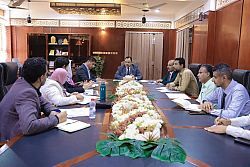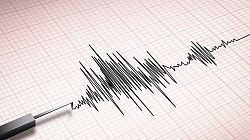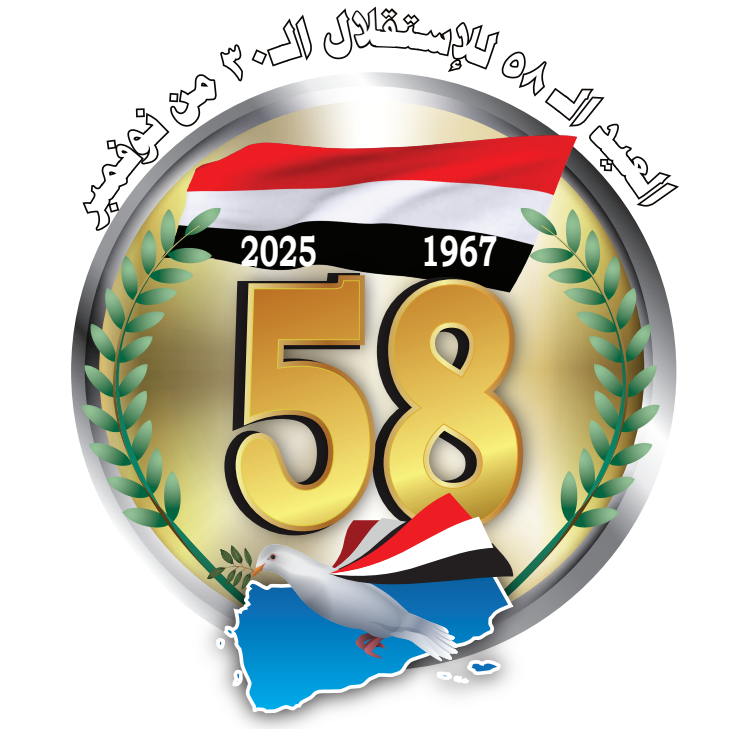
Minister al-Soqatri Discusses with World Food Program Support for Agricultural, Fisheries Sector Projects
Minister of Agriculture, Irrigation, and Fishery Wealth, Salem al-Soqatri discussed Thursday with a delegation from the World Food Program (WFP) in Yemen ways to strengthen partnership and expand projects supporting the agricultural and fishery sectors.

Massive 7.0 Magnitude Earthquake Strikes Alaska, USA
A powerful 7.0 magnitude earthquake struck Alaska, USA, yesterday evening, according to the United States Geological Survey (USGS).

Gold Prices Stabilize as Investors Await Key US Data Release
Gold prices remained steady today, Friday, after rising US Treasury yields offset the dollar's weakness, as investors await crucial US economic data releases.

CAF Unveils Official Mascot for 2025 Africa Cup of Nations in Morocco
The Confederation of African Football (CAF) and the Local Organizing Committee unveiled the official mascot for the 2025 Africa Cup of Nations in Morocco, named "Asad" (Lion), embodying a symbol of African pride and passion for football.
Last Update: ،
2025/12/14
Time
06:56:38
Latest News:
 Guterres: What Hadhramaut is witnessing is a dangerous development, Houthis' arrest of UN employees unacceptable
Guterres: What Hadhramaut is witnessing is a dangerous development, Houthis' arrest of UN employees unacceptable
 Leadership Council Member Maj. General al-Zubaidi inspects work at Ministries of Information, Agriculture
Leadership Council Member Maj. General al-Zubaidi inspects work at Ministries of Information, Agriculture
 Minister of Foreign Affairs meets French Ambassador to Yemen
Minister of Foreign Affairs meets French Ambassador to Yemen
 China reiterates its steadfast support for Yemen's unity, sovereignty, territorial integrity
China reiterates its steadfast support for Yemen's unity, sovereignty, territorial integrity
 Leadership Council Chairman Follows Up on Situation in Hadramout and Al-Mahra
Leadership Council Chairman Follows Up on Situation in Hadramout and Al-Mahra
Latest News:
 Guterres: What Hadhramaut is witnessing is a dangerous development, Houthis' arrest of UN employees unacceptable
Guterres: What Hadhramaut is witnessing is a dangerous development, Houthis' arrest of UN employees unacceptable
 Leadership Council Member Maj. General al-Zubaidi inspects work at Ministries of Information, Agriculture
Leadership Council Member Maj. General al-Zubaidi inspects work at Ministries of Information, Agriculture
 Minister of Foreign Affairs meets French Ambassador to Yemen
Minister of Foreign Affairs meets French Ambassador to Yemen
 China reiterates its steadfast support for Yemen's unity, sovereignty, territorial integrity
China reiterates its steadfast support for Yemen's unity, sovereignty, territorial integrity
 Leadership Council Chairman Follows Up on Situation in Hadramout and Al-Mahra
Leadership Council Chairman Follows Up on Situation in Hadramout and Al-Mahra
WHO: 102 thousand cholera infection cases in Yemen
[10/06/2017 06:44]
GENEVA-SABA
The World Health Organization has announced that cholera is in the apex of proliferation in Yemen as 102 thousand cases of infections and 791 death toll have been reported.
The epidemic is hitting the vulnerable sections of people the hardest; as 46% of the infected are found to be children, 33% to be elderly, according to the WHO.
The epidemic spread in 19 out of 23 Yemeni provinces, but most of those infections occurred in Ibb, Dhamar, Hajjah and Mahweet.
Containing the epidemic in these hotspots will keep it at bay, slow it is spillover and save lives.
Tariq Jarasivik, the WHO spokesman in Geneva said the country's available capacities are not up to the epidemic, since more than half the medical facilities in Yemen are out of service and over 14.5 million people in Yemen have no access to potable drinking water and sanitary services.
Besides, public health servants have not received their salaries for eight months now.
Rampant malnutrition makes things worse, the WHO spokesman said, adding that the organization has made some interventions to improve hygiene; water facilities and sanitation.
Since the beginning of the outbreak, 27 April, the WHO provided Yemen with 197 sachets of intravenous fluids, beds and medicines; set up 100 diarrhea treatment centers and 166 dehydration treatment centers; and, in 25 May, dispatched by plane 67 tons of medicines and medical tools.
King Salman Center for Relief and Humanitarian Aid implemented several programs to the same end of containing the epidemic.
In 25 May, the center signed a USD 8,224,299 anti-cholera program with the WHO. The center also dispatched, by land, a USD1,200,000 worth of medicines and equipment for the diagnosis and tackling of cholera across the country.
The World Health Organization has announced that cholera is in the apex of proliferation in Yemen as 102 thousand cases of infections and 791 death toll have been reported.
The epidemic is hitting the vulnerable sections of people the hardest; as 46% of the infected are found to be children, 33% to be elderly, according to the WHO.
The epidemic spread in 19 out of 23 Yemeni provinces, but most of those infections occurred in Ibb, Dhamar, Hajjah and Mahweet.
Containing the epidemic in these hotspots will keep it at bay, slow it is spillover and save lives.
Tariq Jarasivik, the WHO spokesman in Geneva said the country's available capacities are not up to the epidemic, since more than half the medical facilities in Yemen are out of service and over 14.5 million people in Yemen have no access to potable drinking water and sanitary services.
Besides, public health servants have not received their salaries for eight months now.
Rampant malnutrition makes things worse, the WHO spokesman said, adding that the organization has made some interventions to improve hygiene; water facilities and sanitation.
Since the beginning of the outbreak, 27 April, the WHO provided Yemen with 197 sachets of intravenous fluids, beds and medicines; set up 100 diarrhea treatment centers and 166 dehydration treatment centers; and, in 25 May, dispatched by plane 67 tons of medicines and medical tools.
King Salman Center for Relief and Humanitarian Aid implemented several programs to the same end of containing the epidemic.
In 25 May, the center signed a USD 8,224,299 anti-cholera program with the WHO. The center also dispatched, by land, a USD1,200,000 worth of medicines and equipment for the diagnosis and tackling of cholera across the country.
Key words:
Containing - proliferation - interventions - Organization - organization - malnutrition - Humanitarian - dehydration - intravenous - Rampant - Leadership Council Chairman Follows Up on Situation in Hadramout and Al-Mahra
Leadership Council Chairman Follows Up on Situation in Hadramout and Al-Mahra  Al-Mahrami: Culture of tolerance must be promoted
Al-Mahrami: Culture of tolerance must be promoted  Vice Foreign Minister Discusses Crisis with German Think Tank in Berlin
Vice Foreign Minister Discusses Crisis with German Think Tank in Berlin US Slams Houthi Militia's Ongoing Detaining of Embassy Staff
US Slams Houthi Militia's Ongoing Detaining of Embassy Staff  Ministry of Education, Saudi Program, UNESCO sign agreement worth $40 million to support education
Ministry of Education, Saudi Program, UNESCO sign agreement worth $40 million to support education Leadership Council Member Al-Arada Chairs Meeting with Senior Security Officials
Leadership Council Member Al-Arada Chairs Meeting with Senior Security Officials Vice FM Meets Number of German Organisations
Vice FM Meets Number of German Organisations  Yemen Political Parties Reject Unilateral Actions in Shabwa, Hadramout, and Mahra
Yemen Political Parties Reject Unilateral Actions in Shabwa, Hadramout, and Mahra UNESCO Adds Hadrami Dan to Intangible Cultural Heritage List
UNESCO Adds Hadrami Dan to Intangible Cultural Heritage List Foreign Minister Zindani Meets with UN Special Envoy
Foreign Minister Zindani Meets with UN Special Envoy 


